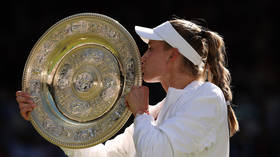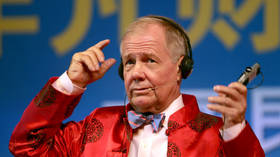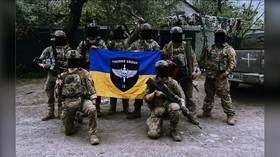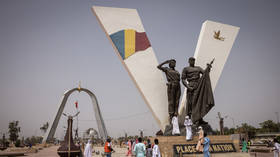Wimbledon champ Rybakina hailed for selfless gesture

Moscow-born Wimbledon champion Elena Rybakina, 23, has rejected a bonus payment from her adopted country of Kazakhstan following her history-making turn on Wimbledon's Center Court last week, instead telling her Kazakh tennis chiefs to funnel the cash towards the development of junior players and to held fund animal shelters in the country.
Rybakina scored the most impressive victory of her career in the London sunshine last Saturday when she bested Tunisia's Ons Jabeur in three sets to claim her maiden Grand Slam win, representing Kazakhstan on the court after switching nationalities from Russian before her 20th birthday.
That decision, made several years ago, assisted her in bypassing the blanket ban imposed by Wimbledon on players from Russia and Belarus; the latest sporting sanction placed upon the two countries in the wake of the Russian military action in Ukraine which launched in late February.
But rather than swell her pockets some more after her historic achievement at the grass court major, Rybakina has instead told figures from within the Kazakhstan Tennis Federation that she wants to see any financial bonuses she is eligible to receive to instead be spent on what she considers to be worth causes.
“First of all, of course, I would like to help the juniors, most of the money will go to them,” said Rybakina at a press conference in Kazakhstan, via the Astana Times.
“And the second important point for me: I was at the animal shelter, and I was very much moved by it, so I would like to allocate money for the animal shelter.”
Much has been made of Rybakina's nationality switch in the past week or so. The Moscow-born star, who still lives in Russia, was tempted by an offer from Kazakh tennis to represent them on the world stage after they pledged to support her financially and provide her with top-level one-on-one coaching.
Speaking at the event, Rybakina doubled-down on her decision and stated firmly that she has no regrets in adopting a new home country in Kazakhstan.
“The transition from juniors to an adult professional career is very difficult,” she said. “Besides the fact that you have to have a good team around you, not everyone is able to continue at the professional level and only a few people reach the top.
“I’ve been very lucky in that respect.
“We found each other, and at the end of the day, I am very happy that my journey continues exactly with Kazakhstan. History is happening together thanks to Kazakhstan. Thank you very much for your support.”












